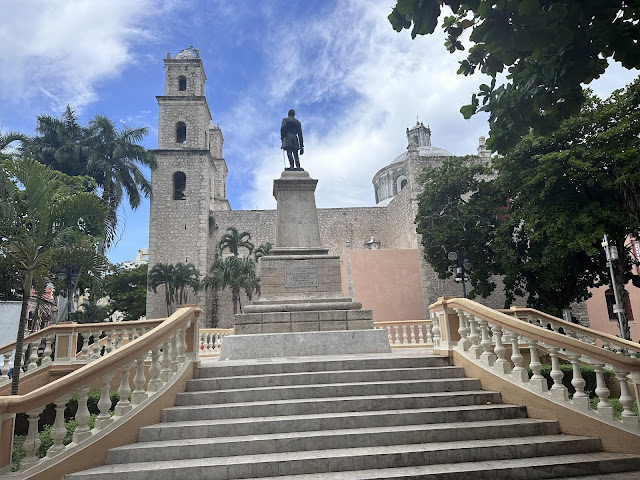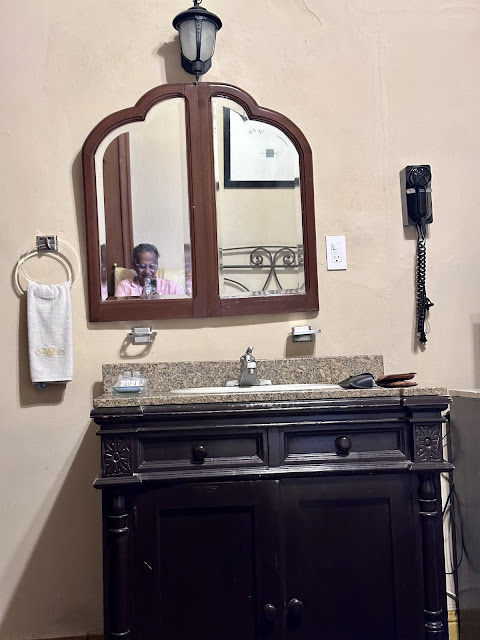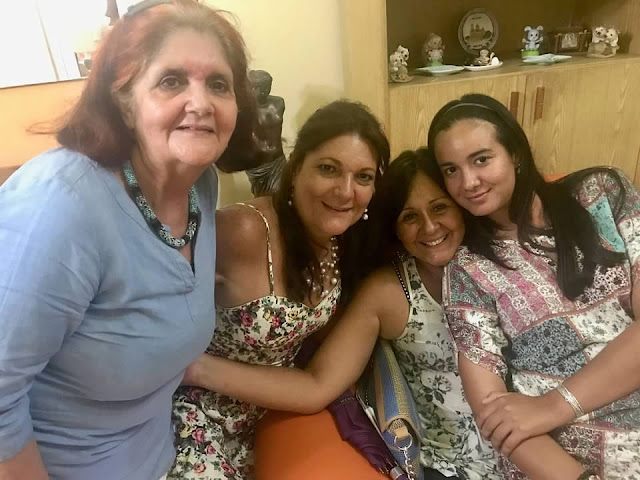In English, French, Spanish, Portuguese and Farsi
Adiós, Cuba y los Recuerdos
Aunque soy australiano, hubo un momento en mi vida en que me sentí profundamente conectado con Cuba. Tenía un apartamento, mucha comida y aún más amigos—amigos cubanos que dejaron una marca permanente en mi corazón, como un tatuaje, como me dijo una vez un artista.
Para vivir cómodamente en Cuba, un estado totalitario, la dividí en tres partes distintas. Estaba la Cuba política, que evitaba por completo; la Cuba económica, un desastre que requería traer el dinero necesario para vivir bien; y la Cuba social, donde el país realmente sobresalía. Las amistades eran ricas, las conversaciones largas, y el tiempo que pasábamos juntos estaba lleno de música, charlas, abrazos y besos. Para mí, La Habana era un festín móvil, como París lo fue para Hemingway.
Pero todo comenzó a desvanecerse con la llegada de la pandemia. La vida social se deterioró y, a medida que la economía empeoraba, la gente perdió la fe en un futuro que sabía que nunca llegaría. Comenzaron a abandonar el país en masa. En poco más de un año, casi 400,000 cubanos llegaron ilegalmente a la frontera de los EE. UU., casi el 4% de la población. Los que se fueron eran a menudo los educados, no ideólogos ni los de mente estrecha que se beneficiaban del aislamiento continuo del gobierno. La mayoría de mis amigos cercanos empacaron y se fueron a México, España, EE. UU. y otros lugares.
Si volviera a La Habana ahora, me sentiría como un fantasma visitando el lugar de un desastre emocional. Mi ropa, mis libros y mis copas de vino siguen allí, pero el espíritu que una vez se aferró al aire de esa ciudad junto al mar se ha ido con los miles que emigraron legal o ilegalmente.
Hoy, mi smartphone me recordó lo que estaba haciendo en La Habana en esta fecha hace seis años. Al mirar las fotos, solo puedo decir: San Cristóbal de La Habana, gracias por la Era Dorada de mi vida dentro de tus confines.
Goodbye Cuba and the Memories
Though I am Australian, there was a time in my life when I felt deeply connected to Cuba. I had a flat, plenty of food, and even more friends—Cuban friends who left a permanent mark on my heart, much like a tattoo, as an artist once told me.
To navigate life comfortably in Cuba, a totalitarian state, I divided it into three distinct parts. There was the political Cuba, which I avoided completely; the economic Cuba, a disaster that required bringing in the necessary money to live well; and the social Cuba, where the country truly excelled. The friendships were rich, the conversations long, and the time spent together was full of music, chats, hugs, and kisses. For me, Havana was a moveable feast, much like Paris was for Hemingway.
But it all began to fade with the onset of the pandemic. Social life deteriorated, and as the economy worsened, people lost faith in a future they knew would never come. They began leaving the country in droves. In just over a year, nearly 400,000 Cubans arrived illegally at the U.S. border—almost 4% of the population. Those who left were often the educated, not ideologues or the narrow-minded who stood to gain from the government’s continued isolation. Most of my close friends packed up and left for Mexico, Spain, the U.S., and elsewhere.
If I were to return to Havana now, I would feel like a ghost visiting the site of an emotional disaster. My clothes, books, and wineglasses are all still there, but the spirit that once clung to the air of that city by the sea has left with the thousands who emigrated legally or illegally.
Today, my smartphone reminded me of what I was doing in Havana on this date six years ago. Looking at the pictures, I can only say: San Cristobal de La Habana, thank you for the Golden Era of my life within your confines.
Adieu, Cuba et les Souvenirs
Bien que je sois australien, il fut un temps où je me sentais profondément lié à Cuba. J'avais un appartement, beaucoup de nourriture, et encore plus d'amis—des amis cubains qui ont laissé une marque indélébile sur mon cœur, comme un tatouage, comme me l'avait dit un artiste.
Pour vivre confortablement à Cuba, un État totalitaire, je l'avais divisé en trois parties distinctes. Il y avait Cuba politique, que j'évitais complètement ; Cuba économique, un désastre qui nécessitait d'apporter l'argent nécessaire pour bien vivre ; et Cuba sociale, où le pays excelle vraiment. Les amitiés étaient riches, les conversations longues, et le temps passé ensemble était rempli de musique, de discussions, de câlins et de baisers. Pour moi, La Havane était une fête mobile, comme Paris l'était pour Hemingway.
Mais tout a commencé à s'estomper avec l'arrivée de la pandémie. La vie sociale s'est détériorée et, à mesure que l'économie se dégradait, les gens ont perdu foi en un avenir qu'ils savaient ne jamais voir arriver. Ils ont commencé à quitter le pays en masse. En un peu plus d'un an, près de 400 000 Cubains sont arrivés illégalement à la frontière des États-Unis, soit près de 4 % de la population. Ceux qui sont partis étaient souvent les personnes éduquées, et non les idéologues ou les esprits étroits qui profitaient de l'isolement continu du gouvernement. La plupart de mes amis proches ont fait leurs valises et sont partis pour le Mexique, l'Espagne, les États-Unis et d'autres endroits.
Si je retournais à La Havane maintenant, je me sentirais comme un fantôme visitant le site d'un désastre émotionnel. Mes vêtements, mes livres, mes verres à vin sont tous encore là, mais l'esprit qui autrefois s'accrochait à l'air de cette ville au bord de la mer est parti avec les milliers de personnes qui ont émigré légalement ou illégalement.
Aujourd'hui, mon smartphone m'a rappelé ce que je faisais à La Havane à cette date il y a six ans. En regardant les photos, je ne peux que dire : San Cristóbal de La Habana, merci pour l'Âge d'Or de ma vie dans tes confins.
two recent medical graduates from Moa visiting me in havanaAdeus, Cuba e as Memórias
Embora eu seja australiano, houve um tempo na minha vida em que me senti profundamente conectado a Cuba. Eu tinha um apartamento, muita comida e ainda mais amigos—amigos cubanos que deixaram uma marca permanente no meu coração, como uma tatuagem, como me disse uma vez um artista.
Para viver confortavelmente em Cuba, um estado totalitário, eu a dividi em três partes distintas. Havia a Cuba política, que eu evitava completamente; a Cuba econômica, um desastre que exigia trazer o dinheiro necessário para viver bem; e a Cuba social, onde o país realmente se destacava. As amizades eram ricas, as conversas longas, e o tempo passado juntos era cheio de música, conversas, abraços e beijos. Para mim, Havana era uma festa móvel, como Paris foi para Hemingway.
Mas tudo começou a desvanecer com a chegada da pandemia. A vida social se deteriorou e, à medida que a economia piorava, as pessoas perderam a fé em um futuro que sabiam que nunca chegaria. Começaram a deixar o país em massa. Em pouco mais de um ano, quase 400.000 cubanos chegaram ilegalmente à fronteira dos EUA, quase 4% da população. Aqueles que partiram eram frequentemente os mais educados, não os ideólogos ou os de mente estreita que se beneficiavam do isolamento contínuo do governo. A maioria dos meus amigos próximos fez as malas e foi para o México, Espanha, EUA e outros lugares.
Se eu voltasse a Havana agora, me sentiria como um fantasma visitando o local de um desastre emocional. Minhas roupas, meus livros e minhas taças de vinho ainda estão lá, mas o espírito que uma vez se apegou ao ar dessa cidade à beira-mar se foi com os milhares que emigraram legal ou ilegalmente.
Hoje, meu smartphone me lembrou do que eu estava fazendo em Havana nesta data, há seis anos. Ao olhar as fotos, só posso dizer: San Cristóbal de La Habana, obrigado pela Era de Ouro da minha vida dentro dos teus limites.
my colleagues from the national institute of endocrinology, havanaخداحافظ کوبا و خاطرات
اگرچه من یک استرالیایی هستم، اما زمانی در زندگیام بود که احساس کردم عمیقاً به کوبا وابسته شدهام. من یک آپارتمان داشتم، غذای فراوان و حتی دوستان بیشتری—دوستان کوبایی که مانند یک خالکوبی، جای خود را بر قلب من گذاشتند، همانطور که یک هنرمند به من گفته بود.
برای زندگی راحت در کوبا، یک دولت تمامیتخواه، آن را به سه بخش مجزا تقسیم کرده بودم. یک کوبای سیاسی که کاملاً از آن اجتناب میکردم؛ یک کوبای اقتصادی که یک فاجعه بود و نیاز به آوردن پول لازم برای زندگی راحت داشت؛ و یک کوبای اجتماعی که در آن کشور واقعاً ممتاز بود. دوستیها غنی بودند، مکالمات طولانی، و زمان گذراندهشده با هم پر از موسیقی، صحبتها، بغلها و بوسهها بود. برای من، هاوانا مانند یک جشن سیار بود، همانطور که پاریس برای همینگوی بود.
اما همه چیز با شیوع همهگیری شروع به محو شدن کرد. زندگی اجتماعی بدتر شد و با بدتر شدن اقتصاد، مردم ایمان خود را به آیندهای که میدانستند هرگز نخواهد آمد، از دست دادند. آنها به طور دستهجمعی شروع به ترک کشور کردند. در کمتر از یک سال، نزدیک به ۴۰۰،۰۰۰ کوبایی به طور غیرقانونی به مرز ایالات متحده رسیدند—تقریباً ۴٪ از جمعیت. کسانی که رفتند اغلب افراد تحصیلکرده بودند، نه ایدئولوگها و نه ذهنهای تنگنظر که از انزوای مستمر دولت بهرهمند میشدند. بیشتر دوستان نزدیک من چمدانهای خود را بستند و به مکزیک، اسپانیا، ایالات متحده و جاهای دیگر رفتند.
اگر اکنون به هاوانا بازگردم، احساس میکنم که مانند یک شبح به محل یک فاجعه احساسی آمدهام. لباسها، کتابها و لیوانهای شراب من هنوز هم آنجا هستند، اما روحی که زمانی به هوای آن شهر کنار دریا چسبیده بود، با هزارانی که به طور قانونی یا غیرقانونی مهاجرت کردهاند، ترک کرده است.
امروز، تلفن هوشمند من به من یادآوری کرد که شش سال پیش در این تاریخ در هاوانا چه کار میکردم. با نگاه کردن به عکسها، فقط میتوانم بگویم: سن کریستوبال د لا هاوانا، متشکرم برای عصر طلایی زندگیام در محدودههایت.
my cuban mother in la habana






























































